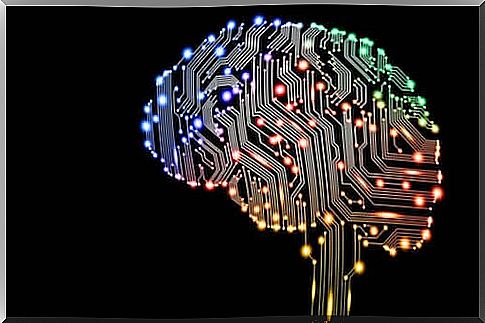Cyberpsychology: What Is It And What Is It For?

Cyberpsychology was born as a need for the progress of a society that cannot do without technology. Addiction to social networks, online pornography, cyberbullying, virtual reality, artificial intelligence, etc.
The fields of work of this discipline are many, almost infinite. Furthermore, we cannot ignore the fact that we are facing a branch of psychology that continues to evolve every day.
Arthur C. Clarke said politicians should read science fiction books and not dramas, westerns or thrillers. Indeed, in some ways, many of the things that once belonged to popular imagination, novels or film productions are now part of everyday life. For example, terms such as “transhumanism” and “technogenesis” have become common today.
Science tells us that in the coming years, human beings will have technological interfaces available that will improve their physical and intellectual abilities. There are many changes that await us and just as many are the needs and challenges we will face. Cyberpsychology tries to explain, support and answer all the questions that arise from this new dimension.

What is the purpose of cyberpsychology?
More than half of the world’s population has access to the Internet. Who more or less has a smartphone, a computer or a tablet with which they spend most of their day (for work, for leisure, to see a movie, etc.).
With the arrival of the new millennium, it is evident that the impact of new technologies has completely reshaped the fabric of our society and the way we conceive of reality.
Cyberpsychology is a study tool to try to understand human behavior in relation to technology, social networks and artificial intelligence. It is evident that we are all part of that “matrix” that totally shapes our habits of interaction, socialization, leisure time, learning, information research, shopping, etc.
Since the dependence on our devices and the internet is almost total, developing this area of psychology is now necessary. However, it must be emphasized that cyberpsychology as such was born in the nineties.
Psychologist John Suler, of Ryder University in New Jersey, tells us in his book The Psychology of Cyberspace that it was in those years that people began to realize that something was happening.
What are the fields of study of cyberpsychology?
The study conducted by Dr. Julie Ancis of the University of New Jersey shows us something important: the Internet, smartphones and social networks have brought numerous benefits to our lives. However, they have also opened a door to new psychological disorders, new forms of violence and cybercrime.
Cyberpsychology tries to understand the dynamics that are created when we use new technologies and all those phenomena to which we cannot be indifferent today. Let’s find out what are its areas of study and analysis.
Social networks
Social networks are more than just applications that allow us to stay in touch with our friends and acquaintances. They are our window to the world and even the mirror in which we reflect.
We process reality through them and use them to inform us, share information, publish our photos and comments and interact with strangers.
The psychological dynamics that develop in these contexts are manifold. You have to understand them and know how to act accordingly. We know, for example, that the mental health of young people is closely linked to the use and abuse of Social Networks.
Cyberpsychology for understanding virtual communities
People find themselves in virtual communities, in virtual spaces where they share and create information. Sometimes, all of this is very enriching and productive. However, it is possible that virtual communities become breeding grounds for cybercrime.
Use and abuse of smartphones
How do we use our phone? How do we do it based on age? Disorders such as nomophobia and cell phone addiction are a field of study of cyberpsychology.
Addictions: games, pornography, online shopping
In recent years, behavioral addictions are overtaking substance addictions. We refer, for example, to addiction to online gambling, video games, pornography or online shopping.
Cyberbullying and dynamics of online aggression
Cyberbullying is another increasingly frequent form of violence, especially among teenagers. Cyberpsychology also studies phenomena such as smear campaigns, fake news, trolls, memes, etc.

Social engineering and manipulation
Other common events that often occur on the internet are social manipulation mechanisms and cyber attacks. For example, spear phishing attacks (text message or email fraud) that try to infect devices with malware to steal information.
Cyberpsychology is oriented towards psychological well-being
There is an interesting aspect to take into consideration: cyberpsychology is oriented above all to the development of the person and to the study of his participation in social contexts. This is a step in our evolution, one in which, more than ever, man is linked to technology.
It is important to emphasize that developing sectors such as artificial intelligence must always be at our service and never against us. So, if the APA ( American Psychological Association ) already considers cyberpsychology as an extra specialty, it is because the ultimate goal is to ensure that the technology is at our service.
Realities such as online therapy or virtual reality to treat anxiety, phobias or other disorders are increasingly common tools. Furthermore, they are a clear and obvious example of how the universe of cables, connections, algorithms or subroutines can heal and improve our psychological well-being.








